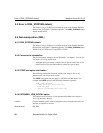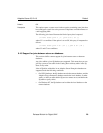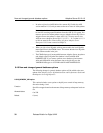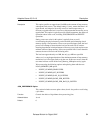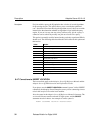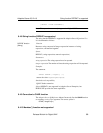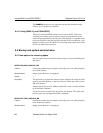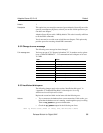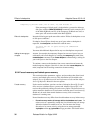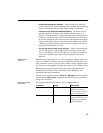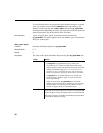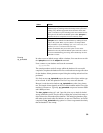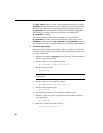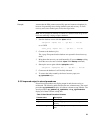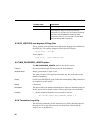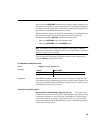
Effect of checkpoints Adaptive Server IQ 12.4.0
36
Release Bulletin for Digital UNIX
Temporary IQ Blocks Used:,163 of 6144, 2%, Max Block#: 97
If the percentage of blocks used is in the nineties, you need to add more
disk space with the
CREATE DBSPACE command. In this example, 82%
of the Main IQ Blocks and 2% of the Temporary IQ Blocks are used, so
more space will soon be needed in the Main IQ Store.
Effect of checkpoints
Insert the following text at the start of the section “Effect of checkpoints on out
of disk space conditions.”
If Adaptive Server IQ has already run out of space when a checkpoint is
requested, the
checkpoint command fails with the error:
You have run out of space during the CHECKPOINT
operation.
You must add additional dbspace before any new checkpoints can proceed.
Adding the wrong type
of space
Assume, for example, the temporary dbspace has run out of space, but you
accidentally add a main dbspace by omitting the
temporary keyword in the
create dbspace command. Your create dbspace command hangs, waiting for
you to add space to the first dbspace.
To continue, connect to the database from a new connection and create the
needed temporary dbspace. Once this is done, the other
create dbspace (for
main) completes and all waiting connections resume running.
9.5.4 Forced recovery and leaked space recovery
This section describes parameters, options, and procedures that allow forced
recovery and leaked space recovery. This information will be added to the
Adaptive Server IQ Administration and Performance Guide and the Adaptive
Server IQ Reference Manual in the next update.
Forced recovery
Under certain conditions, previous versions of Adaptive Server IQ 12 could
fail to recover a database after a system crash. Adaptive Server IQ 12.4.0
resolves this problem by adding a forced recovery option. The forced recovery
option returns the database to its last known consistent state. Forced recovery
should only be used when normal database recovery fails to restore the
database to a running state.
Normal database recovery differs from forced database recovery in these ways:
• Forced recovery marks all storage within the database as in use. In
order to recover a potentially corrupt free list (allocation map) all storage
within the database is marked as in use. You can return the storage
allocation to its correct value by using the server startup parameter
-iqdroplks and the sp_iqcheckdb storage procedure. See details below.



